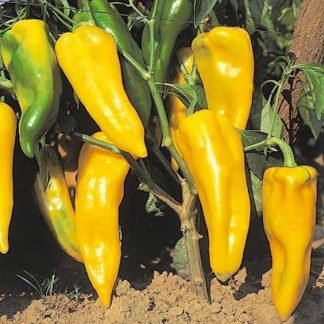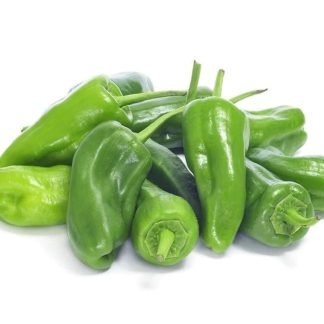Description
Red Bell Pepper Seeds
CULTURE:
Peppers will thrive in well-drained, fertile soils with a pH of 6.5. Abundant phosphorus and calcium is needed for the best results.
GROWING SEEDLINGS:
Sow seed in 20 row or shallow flats 4 seeds/in., 1/4″ deep, in late March or about 8 weeks prior to transplanting outdoors. If possible, maintain soil temperatures 80-90°F (27-32°C). Pepper seeds germinate very slowly in cooler soil. When the first true leaves appear transplant seedlings into 2″ cell-type containers or 4″pots. Grow plants at approx. 70°F (21°C) day and 60°F (16°C) nights.
COLD TREATMENT:
Exposing the seedlings to controlled cold treatments can increase the number of flowers and fruits. When the third true leaf appears, grow the plants at a minimum night temp. of 53-55°F (12-13°C) for 4 weeks. The plants should receive full sunlight. After 4 weeks adjust temp. to 70°F (21°C) day and night. If this technique is used, peppers should be seeded 1-2 weeks earlier than usual.
TRANSPLANTING:
Transplant out after frost when the soil is warm and weather is settled. Ideal seedlings have buds, but no open flowers. Set plants 12-18″ apart in rows 24-36″ apart, or 2 rows on poly/paper mulch, 18″ between plants. Water-in transplants using a high phosphorus solution.
ROW COVERS:
Cold weather is buffered and earliness increased by using plastic mulch, especially in combination with lightweight fabric row cover supported by wire hoops. (See Mulch and Row Covers in Index.) Remove row covers in sunny weather above 85°F (29°C) to prevent blossom drop and heat damage.
INSECT PESTS:
Control climbing cutworms with Bacillus thuringiensis, or with paper cylinder collars. Control tarnished plant bugs, aphids, and flea beetles with pyrethrin.
DISEASES AND PROBLEMS:
To prevent bacterial spot and phytopthora, drip irrigate only, plant only in well-drained soils, minimize soil compaction, follow a 4-year crop rotation. Sunscald is caused by an inadequate foliage canopy. Prevent blossom end rot with adequate soil calcium and regular moisture. Big bushy plants with few peppers can be caused by an excess of nitrogen, hot or cold temperature extremes during the flowering period, tarnished plant bug injury, and choice of late, poorly-adapted varieties.
BACTERIAL SPOT NOTICE:
Bacterial spot can be seed borne. All Johnny’s pepper seed lots are tested for bacterial spot, and we chlorine wash any positive lots. No treatment can insure absolute freedom from disease.
NOTE:
A disease-free test result does not guarantee a seed lot to be disease-free, only that in the sample tested, the pathogen targeted was not found.
HARVEST AND STORAGE:
Pick the first peppers promptly when they reach full size to encourage further fruit set. Wash and hold at 45°F (7°C) and 95% relative humidity.
DAYS TO MATURITY:
Approximate days from transplanting outdoors to first pickings of full size fruit.
AVG. TRANSPLANT SEEDING RATE:
Avg. 19 plants/ Pkt., 750 plants/1,000 seeds, 19,360 seeds per acre of transplants (avg. 14,520 plants), 12″ between plants in rows 36″ apart.
SEED SPECS:
SEEDS/OZ.: 3,400-4,900 (avg. 4,000).
PACKET:
20 seeds.




Reviews
There are no reviews yet.